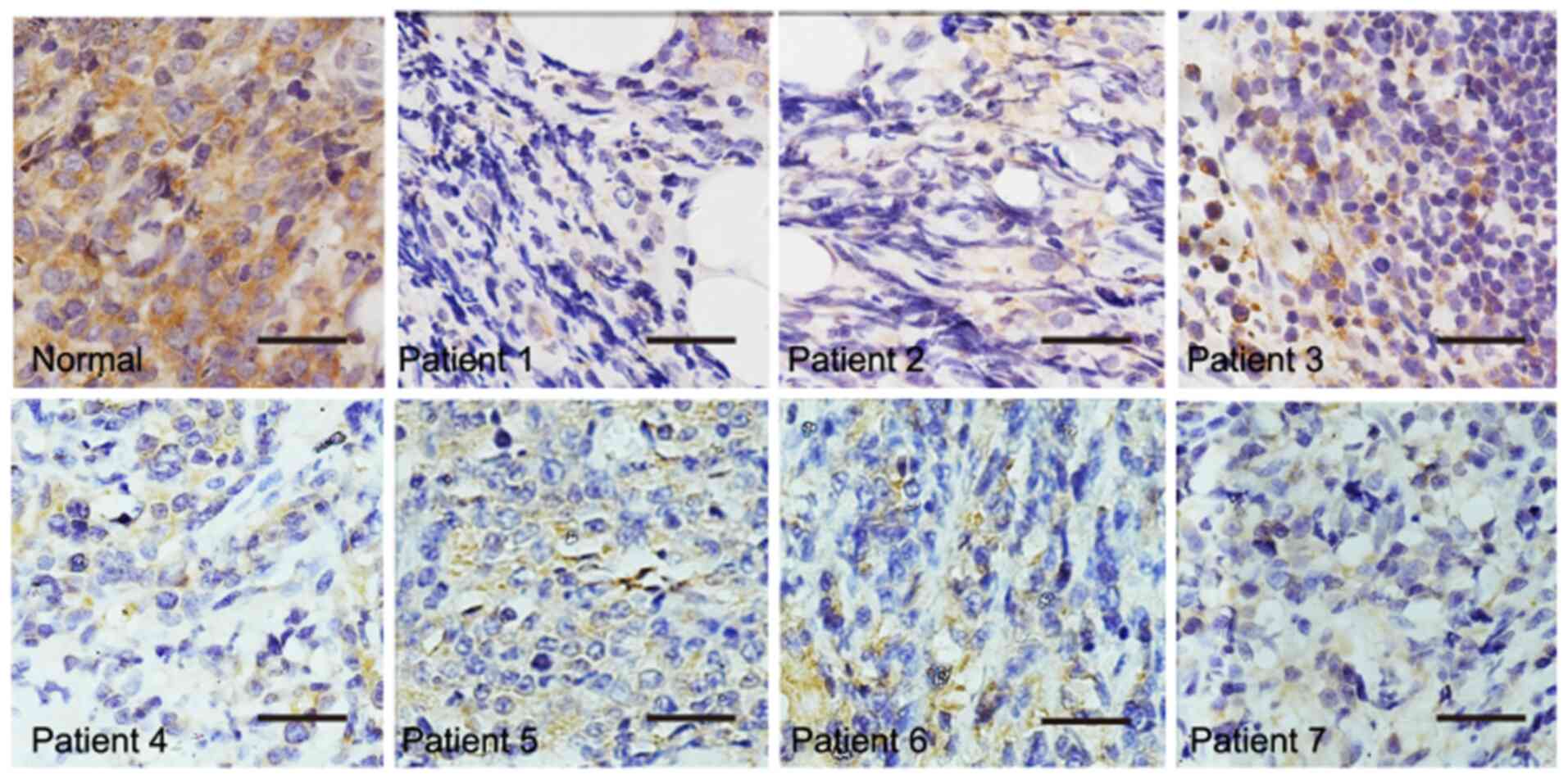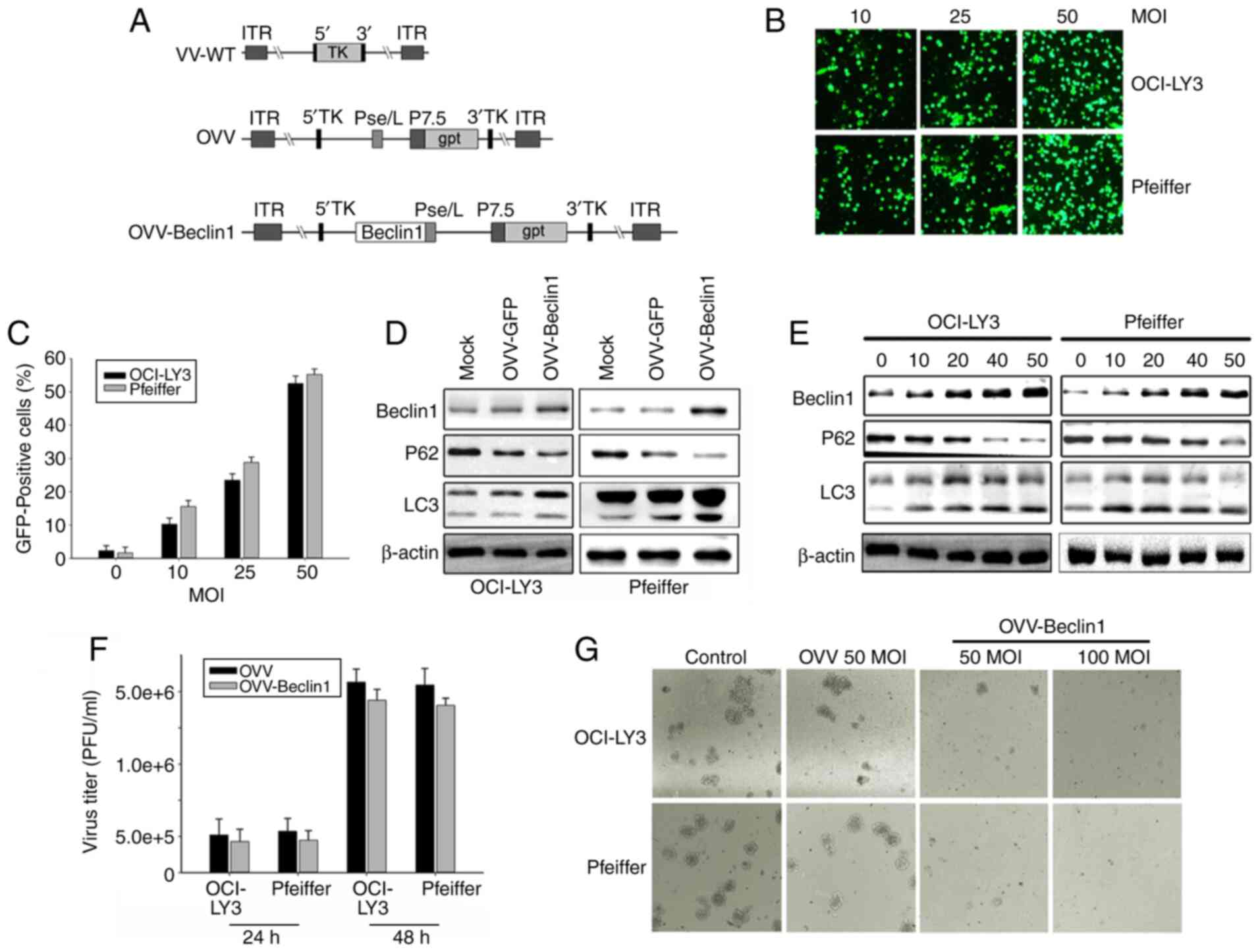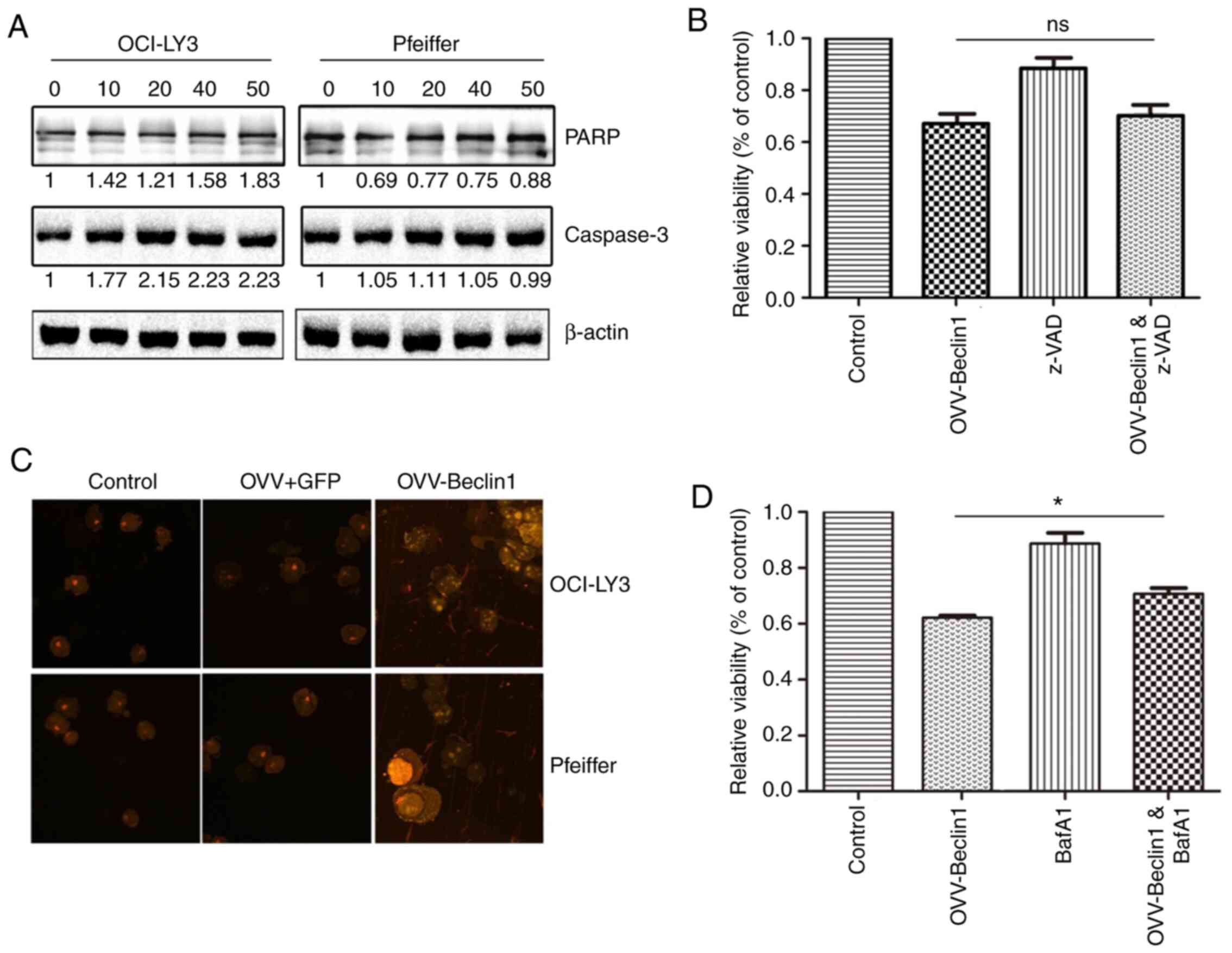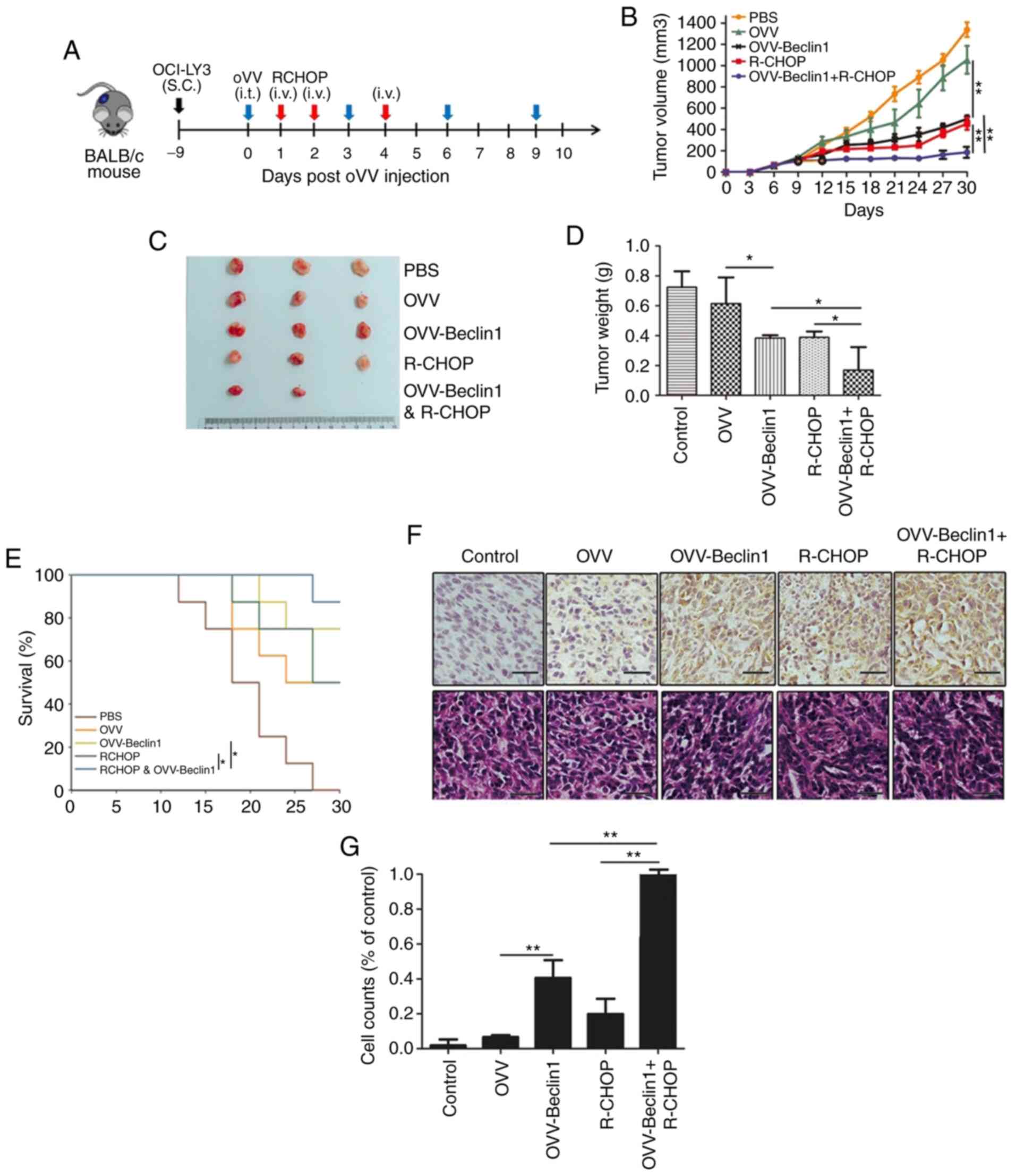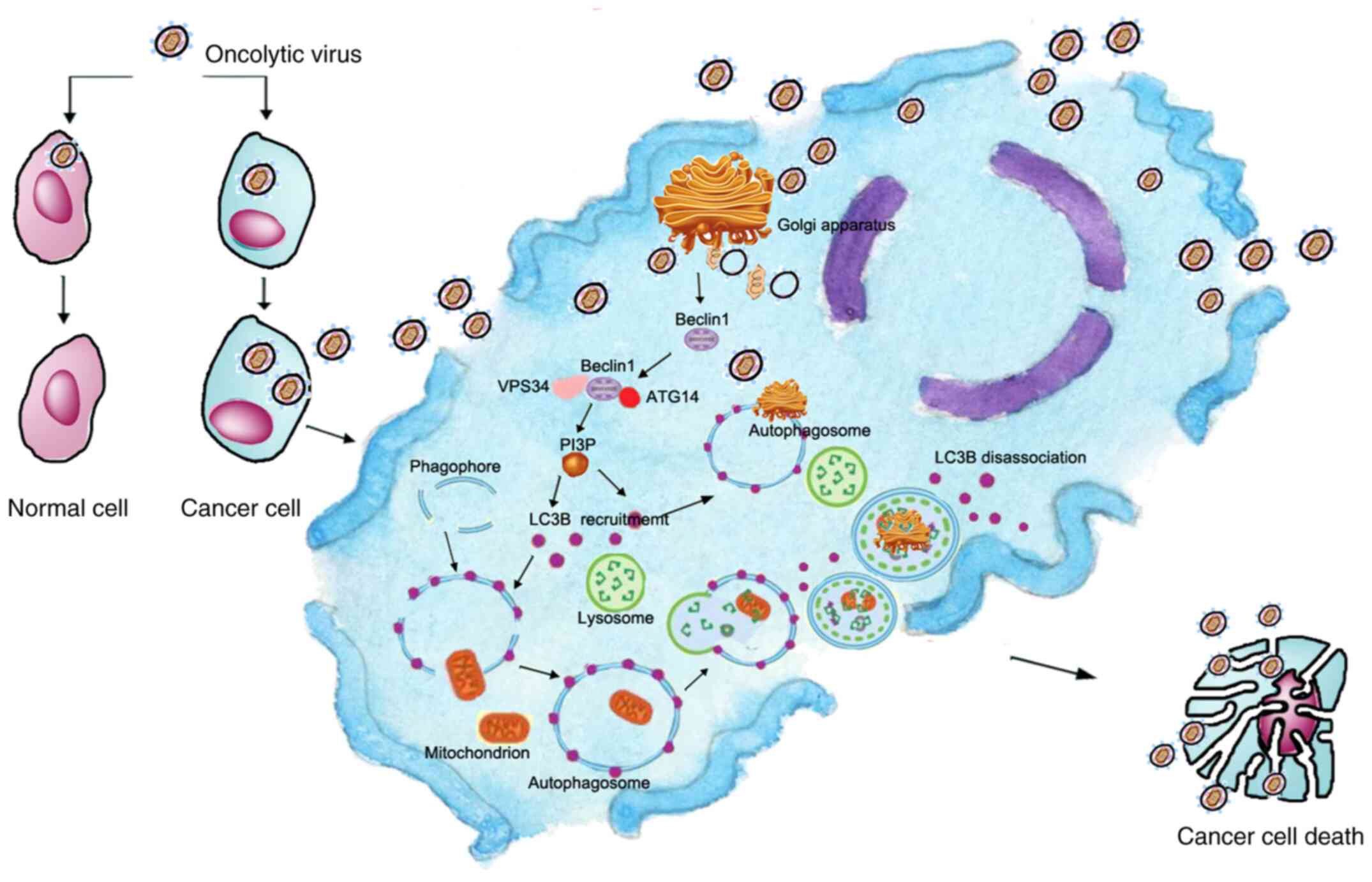|
1
|
Howlader N, Morton L, Feuer E, Besson C
and Engels E: Contributions of subtypes of non-hodgkin lymphoma to
mortality trends. Cancer Epidemiol Biomarkers Prev. 25:174–179.
2016. View Article : Google Scholar : PubMed/NCBI
|
|
2
|
Coccaro N, Anelli L, Zagaria A, Perrone T,
Specchia G and Albano F: Molecular complexity of diffuse large
b-cell lymphoma: Can it be a roadmap for precision medicine?
Cancers. 12:1852020. View Article : Google Scholar
|
|
3
|
Camicia R, Winkler HC and Hassa PO: Novel
drug targets for personalized precision medicine in
relapsed/refractory diffuse large B-cell lymphoma: A comprehensive
review. Mol Cancer. 14:2072015. View Article : Google Scholar : PubMed/NCBI
|
|
4
|
Xu-Monette ZY, Wu L, Visco C, Tai YC,
Tzankov A, Liu Wm, Montes-Moreno S, Dybkaer K, Chiu A, Orazi A, et
al: Mutational profile and prognostic significance of TP53 in
diffuse large B-cell lymphoma patients treated with R-CHOP: Report
from an international DLBCL rituximab-CHOP consortium program
study. Blood. 120:3986–3996. 2012. View Article : Google Scholar : PubMed/NCBI
|
|
5
|
Lee D, Lee D, Hwang Y, Seo H, Lee S and
Kwon J: The bromodomain inhibitor PFI-3 sensitizes cancer cells to
DNA damage by targeting SWI/SNF. Mol Cancer Res. 18:02892020.
|
|
6
|
Wechman SL, Pradhan AK, DeSalle R, Das SK,
Emdad L, Sarkar D and Fisher PB: New insights into beclin-1:
Evolution and pan-malignancy inhibitor activity. Adv Cancer Res.
137:77–114. 2018. View Article : Google Scholar : PubMed/NCBI
|
|
7
|
Roy DG and Bell JC: Cell carriers for
oncolytic viruses: Current challenges and future directions.
Oncolytic Virother. 2:47–56. 2013.PubMed/NCBI
|
|
8
|
Aitken AS, Roy DG and Bourgeois-Daigneault
MC: Taking a stab at cancer; oncolytic virus-mediated anti-cancer
vaccination strategies. Biomedicines. 5:32017. View Article : Google Scholar
|
|
9
|
Willmon C, Harrington K, Kottke T,
Prestwich R, Melcher A and Vile R: Cell carriers for oncolytic
viruses: Fed ex for cancer therapy. Mol Ther. 17:1667–1676. 2009.
View Article : Google Scholar : PubMed/NCBI
|
|
10
|
Amin AD, Peters TL, Li L, Rajan SS,
Choudhari R, Puvvada SD and Schatz JH: Diffuse large B-cell
lymphoma: Can genomics improve treatment options for a curable
cancer? Cold Spring Harb Mol Case Stud. 3:a0017192017. View Article : Google Scholar : PubMed/NCBI
|
|
11
|
Huang F, Wang BR and Wang YG: Role of
autophagy in tumori-genesis, metastasis, targeted therapy and drug
resistance of hepatocellular carcinoma. World J Gastroenterol.
24:4643–4651. 2018. View Article : Google Scholar : PubMed/NCBI
|
|
12
|
Denton D, Nicolson S and Kumar S: Cell
death by autophagy: Facts and apparent artefacts. Cell Death
Differ. 19:87–95. 2012. View Article : Google Scholar : PubMed/NCBI
|
|
13
|
Puri P and Chandra A: Autophagy modulation
as a potential therapeutic target for liver diseases. J Clin Exp
Hepatol. 4:51–59. 2014. View Article : Google Scholar : PubMed/NCBI
|
|
14
|
Galluzzi L, Pietrocola F, Bravo-San Pedro
JM, Amaravadi RK, Baehrecke EH, Cecconi F, Codogno P, Debnath J,
Gewirtz DA, Karantza V, et al: Autophagy in malignant
transformation and cancer progression. EMBO J. 34:856–880. 2015.
View Article : Google Scholar : PubMed/NCBI
|
|
15
|
Correa RJM, Valdes YR, Shepherd TG and
DiMattia GE: Beclin-1 expression is retained in high-grade serous
ovarian cancer yet is not essential for autophagy induction in
vitro. J Ovarian Res. 8:1–15. 2015. View Article : Google Scholar : PubMed/NCBI
|
|
16
|
Hasui K, Wang J, Jia X, Tanaka M, Nagai T,
Matsuyama T and Eizuru Y: Enhanced autophagy and reduced expression
of cathepsin d are related to autophagic cell death in epstein-barr
virus-associated nasal natural killer/T-cell lymphomas: An
immunohistochemical analysis of beclin-1, LC3, mitochondria (AE-1),
and cathepsin D in nasopharyngeal lymphomas. Acta Histochem
Cytochem. 44:119–131. 2011. View Article : Google Scholar : PubMed/NCBI
|
|
17
|
Guaman-Ortiz LM, Orellana MIR and
Ratovitski EA: Natural compounds as modulators of non-apoptotic
cell death in cancer cells. Curr Genom. 18:132–155. 2017.
View Article : Google Scholar
|
|
18
|
Shen HM and Codogno P: Autophagic cell
death: Loch ness monster or endangered species? Autophagy.
7:457–465. 2011. View Article : Google Scholar : PubMed/NCBI
|
|
19
|
Sui X, Chen R, Wang Z, Huang Z, Kong N,
Zhang M, Han W, Lou F, Yang J, Zhang Q, et al: Autophagy and
chemotherapy resistance: A promising therapeutic target for cancer
treatment. Cell Death Dis. 4:e8382013. View Article : Google Scholar : PubMed/NCBI
|
|
20
|
Derenzini E, Agostinelli C, Imbrogno E,
Iacobucci I, Casadei B, Brighenti E, Righi S, Fuligni F, Di Rorà
AGL, Ferrari A, et al: Constitutive activation of the DNA damage
response pathway as a novel therapeutic target in diffuse large
B-cell lymphoma. Oncotarget. 6:6553–6569. 2015. View Article : Google Scholar : PubMed/NCBI
|
|
21
|
Czarny P, Pawlowska E, Bialkowska-Warzecha
J, Kaarniranta K and Blasiak J: Autophagy in DNA damage response.
Int J Mol Sci. 16:2641–2662l. 2014. View Article : Google Scholar
|
|
22
|
Zhang D, Tang B, Xie X, Xiao YF, Yang SM
and Zhang JW: The interplay between DNA repair and autophagy in
cancer therapy. Cancer Biol Ther. 16:1005–1013. 2014. View Article : Google Scholar
|
|
23
|
Mizushima N.; Autophagy, : Process and
function. Genes Dev. 21:2861–2873. 2007. View Article : Google Scholar : PubMed/NCBI
|
|
24
|
Rojas JJ and Thorne SH: Theranostic
potential of oncolytic vaccinia virus. Theranostic. 2:363–373.
2012. View Article : Google Scholar
|
|
25
|
Quirin C, Rohmer S, Fernández-Ulibarri I,
Behr M, Hesse A, Engelhardt S, Erbs P, Enk AH and Nettelbeck DM:
Selectivity and efficiency of late transgene expression by
transcriptionally targeted oncolytic adenoviruses are dependent on
the transgene insertion strategy. Hum Gene Ther. 22:389–404. 2007.
View Article : Google Scholar
|
|
26
|
Bastin D, Walsh SR, Saigh MA and Wan Y:
Capitalizing on cancer specific replication: Oncolytic viruses as a
versatile platform for the enhancement of cancer immunotherapy
strategies. Biomedicines. 4:212016. View Article : Google Scholar
|
|
27
|
Haddad D: Genetically engineered vaccinia
viruses as agents for cancer treatment, imaging, and transgene
delivery. Front Oncol. 7:962017. View Article : Google Scholar : PubMed/NCBI
|
|
28
|
Buijs PR, Verhagen JH, van Eijck CH and
van den Hoogen BG: Oncolytic viruses: From bench to bedside with a
focus on safety. Hum Vaccin Immunother. 11:1573–1584. 2007.
View Article : Google Scholar
|
|
29
|
Deng L, Fan J, Ding Y, Zhang J and Huang
B: Oncolytic efficacy of thymidine kinase-deleted vaccinia virus
strain guang9. Oncotarget. 8:40533–40543. 2017. View Article : Google Scholar : PubMed/NCBI
|
|
30
|
Lei W, Wang S, Xu N, Chen Y, Wu G, Zhang
A, Chen X, Tong Y and Qian W: Enhancing therapeutic efficacy of
oncolytic vaccinia virus armed with beclin-1, an autophagic gene in
leukemia and myeloma. Biomed Pharmacother. 125:1100302020.
View Article : Google Scholar : PubMed/NCBI
|
|
31
|
Tong Y, You L, Liu H, Li L, Meng H, Qian Q
and Qian W: Potent antitumor activity of oncolytic adenovirus
expressing beclin-1 via induction of autophagic cell death in
leukemia. Oncotarget. 4:860–874. 2013. View Article : Google Scholar : PubMed/NCBI
|
|
32
|
Yu HC, Hou DR, Liu CY, Lin CS, Shiau CW,
Cheng AL and Chen KF: Cancerous inhibitor of protein phosphatase 2A
mediates bortezomib-induced autophagy in hepatocellular carcinoma
independent of proteasome. PLoS One. 8:e557052013. View Article : Google Scholar : PubMed/NCBI
|
|
33
|
Diaz SL: Conducting and reporting animal
experimentation: Quo vadis? Eur J Neurosci. 52:3493–3498. 2020.
View Article : Google Scholar : PubMed/NCBI
|
|
34
|
Nguyen T, Shaid S, Vakhrusheva O, Koschade
SE, Klann K, Thölken M, Baker F, Zhang J, Oellerich T, Sürün D, et
al: Loss of the selective autophagy receptor p62 impairs murine
myeloid leukemia progression and mitophagy. Blood. 133:168–179.
2019. View Article : Google Scholar : PubMed/NCBI
|
|
35
|
Araveti PB and Srivastava A: Curcumin
induced oxidative stress causes autophagy and apoptosis in bovine
leucocytes transformed by. Cell Death Discov. 5:1002019. View Article : Google Scholar : PubMed/NCBI
|
|
36
|
Islam SM, Lee B, Jiang F, Kim E, Ahn S and
Hwang TH: Engineering and characterization of oncolytic vaccinia
virus expressing truncated herpes simplex virus thymidine kinase.
Cancers. 12:2282020. View Article : Google Scholar
|
|
37
|
Walsh S, Bastin D, Chen L, Nguyen A,
Storbeck CJ, Lefebvre C, Stojdl D, Bramson JL, Bell JC and Wan Y:
Type I IFN blockade uncouples immunotherapy-induced antitumor
immunity and autoimmune toxicity. J Clin Invest. 129:518–530. 2019.
View Article : Google Scholar : PubMed/NCBI
|
|
38
|
Zhang B and Cheng P: Improving antitumor
efficacy via combinatorial regimens of oncolytic virotherapy. Mol
Cancer. 19:1582020. View Article : Google Scholar : PubMed/NCBI
|
|
39
|
Bourgeois-Daigneault M, Roy DG, Aitken AS,
El Sayes E, Martin NT, Varette O, Falls T, St-Germain LE, Pelin A,
Lichty BD, et al: Neoadjuvant oncolytic virotherapy before surgery
sensitizes triple-negative breast cancer to immune checkpoint
therapy. Sci Transl Med. 10:4222018. View Article : Google Scholar
|
|
40
|
Guo ZS, Lu B, Guo Z, Giehl E, Feist M, Dai
E, Liu W, Storkus WJ, He Y, Liu Z and Bartlett DL: Vaccinia
virus-mediated cancer immunotherapy: Cancer vaccines and
oncolytics. J Immunother Cancer. 7:62019. View Article : Google Scholar : PubMed/NCBI
|
|
41
|
Liu Z, Ge Y, Wang H, Ma C, Feist M, Ju S,
Guo ZS and Bartlett DL: Modifying the cancer-immune set point using
vaccinia virus expressing re-designed interleukin-2. Nat Commun.
9:46822018. View Article : Google Scholar : PubMed/NCBI
|
|
42
|
Hill SM, Wrobel L and Rubinsztein DC:
Post-translational modifications of Beclin 1 provide multiple
strategies for autophagy regulation. Cell Death Differ. 26:617–629.
2019. View Article : Google Scholar : PubMed/NCBI
|
|
43
|
Place DE and Kanneganti TD: Cell
death-mediated cytokine release and its therapeutic implications. J
Exp Med. 216:1474–1486. 2019. View Article : Google Scholar : PubMed/NCBI
|
|
44
|
Torii S, Honda S, Murohashi M, Yamaguchi H
and Shimizu S: Autophagy involvement in oncogenesis. Cancer Sci.
111:3993–3999. 2020. View Article : Google Scholar : PubMed/NCBI
|
|
45
|
Levy JM and Thorburn A: Autophagy in
cancer: Moving from understanding mechanism to improving therapy
responses in patients. Cell Death Differ. 27:843–857. 2020.
View Article : Google Scholar : PubMed/NCBI
|
|
46
|
Liu G, Pei F, Yang F, Li L, Amin AD, Liu
S, Buchan JR and Cho WC: Role of autophagy and apoptosis in
non-small-cell lung cancer. Int J Mol Sci. 18:3672017. View Article : Google Scholar
|
|
47
|
Zhang J, Yang S, Wang K, Huang Y, Yang N,
Yang Z, Zheng Z and Wang Y: Crocin induces autophagic cell death
and inhibits cell invasion of cervical cancer SiHa cells through
activation of PI3K/AKT. Ann Transl Med. 8:11802020. View Article : Google Scholar : PubMed/NCBI
|
|
48
|
Huang JJ, Zhu YJ, Lin TY, Jiang WQ, Huang
HQ and Li ZM: Beclin 1 expression predicts favorable clinical
outcome in patients with diffuse large B-cell lymphoma treated with
R-CHOP. Hum Pathol. 42:1459–1466. 2011. View Article : Google Scholar : PubMed/NCBI
|
|
49
|
Wang Z, Zhu S, Zhang G and Liu S:
Inhibition of autophagy enhances the anticancer activity of
bortezomib in B-cell acute lymphoblastic leukemia cells. Am J
Cancer Res. 5:639–650. 2015.PubMed/NCBI
|
|
50
|
Zhu Y, Jia H, Gao G, Pan GY, Jiang YW, Li
P, Zhou N, Li C, She C, Ulrich NW, et al: Mitochondria-acting
nanomicelles for destruction of cancer cells via excessive
mitophagy/autophagy-driven lethal energy depletion and
phototherapy. Biomaterials. 232:1196682020. View Article : Google Scholar : PubMed/NCBI
|















